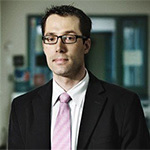Physicians struggle to clinically diagnose early HIV infection
Journal of the American Medical Association study reveals early detection is easily missed
July 15, 2014 - Despite the belief that early HIV infection presents with a well recognized flu-like syndrome, most
physicians are unable to use clinical skills to differentiate those who should and should not be tested for HIV infection, according
to a study published July 15 in the Journal of the American Medical Association (JAMA).
Researchers at the BC Centre for Excellence in HIV/AIDS and University of British Columbia, Oregon Health and Science
University, and Duke University Medical Centre analyzed data from over 24,000 patients, and discovered physicians have great
difficulty recognizing the presence or absence of early HIV infection through clinical exam alone.
During the period of early HIV infection, past research showed that 50 to 90 percent of patients develop one or more of the
following symptoms: fever, nausea/vomiting, weight loss, rashes, oral ulcers, and swollen lymph glands. While identifying HIV infection
early can greatly contribute to reduced mortality and the likelihood of further HIV transmission, these symptoms are too non-specific
for physicians to recognize, whereas the absence of symptoms does not reliably exclude infection.
 "This study is not meant to be critical of physicians because of the limitations of our ability to discern who should and should
not be tested for HIV infection," says Dr. Evan Wood, lead author and Canada Research Chair in Inner City Medicine at the University of
British Columbia Faculty of Medicine. "Rather, this study highlights the importance of routine HIV testing, just like we routinely test for other health conditions." "This study is not meant to be critical of physicians because of the limitations of our ability to discern who should and should
not be tested for HIV infection," says Dr. Evan Wood, lead author and Canada Research Chair in Inner City Medicine at the University of
British Columbia Faculty of Medicine. "Rather, this study highlights the importance of routine HIV testing, just like we routinely test for other health conditions."
In May, British Columbia became the first province in Canada to introduce guidelines for routine HIV testing for all adult British
Columbians.
"We realized through our four-year STOP HIV/AIDS pilot program that many clinical opportunities to make a diagnosis and offer
treatment were being missed," says Dr. Perry Kendall, B.C.'s provincial health officer. "Based on this experience we developed
and released guidelines for front-line practitioners recommending routine HIV screening for adults. This combination of
increased testing and access to free antiretroviral drugs is both evidence-based and effective. Today's study in JAMA
provides further evidence B.C. is leading the way globally in demonstrating how HIV can be controlled and virtually eliminated."
Despite recommendations from the World Health Organization and U.S. Centre for Disease Control, most jurisdictions in the U.S. and
globally are falling behind the approach taken in B.C. A recent survey of 376 U.S. hospitals found that less than 10 per cent of
hospitals reported universal screening of inpatients and outpatients and less than 35 per cent reported screening some or all
adult patients.
"A simple blood test in conjunction with clinical evaluation enables us to detect this disease early and provide life-saving
treatment," says Dr. Julio Montaner, Director of the British Columbia Centre for Excellence in HIV/AIDS, Chair of AIDS Research and Head
of the Division of AIDS at the University of British Columbia Faculty of Medicine. "We know routine HIV testing works, and our goal
is to bring the success we have had in British Columbia in controlling HIV and AIDS to the rest of Canada and around the world."
###
About the British Columbia Centre for Excellence in HIV/AIDS:
The BC Centre for Excellence in HIV/AIDS (BC-CfE) is Canada's largest HIV/AIDS research, treatment and education facility and is
internationally recognized as an innovative world leader in combating HIV/AIDS and related diseases. BC-CfE is based at
St. Paul's Hospital in Vancouver, a teaching hospital of the University of British Columbia and operated by
Providence Health Care. www.cfenet.ubc.ca
About the University of British Columbia:
UBC is one of North America's largest public research and teaching institutions, and one of only two Canadian institutions consistently
ranked among the world's 40 best universities. UBC offers more than 55,000 students a range of innovative programs and attracts
$550 million per year in research funding from government, non-profit organizations and industry through 7,000
grants. www.ubc.ca
###
Find other stories about: BC Centre for Excellence in HIV/AIDS , Evan Wood , Faculty of Medicine , Julio Montaner
CONTACT:
Brian Kladko
Communications Manager
UBC Faculty of Medicine
Tel: 604.827.3301
Mobile: 778.838.4169
Email: brian.kladko@ubc.ca
Source: http://news.ubc.ca/2014/07/15/physicians-struggle-to-clinically-diagnose-early-hiv-infection/
Reproduced with permission - "University of British Columbia"
University of British Columbia
For more HIV and AIDS News visit...
Positively Positive - Living with HIV/AIDS:
HIV/AIDS News
|